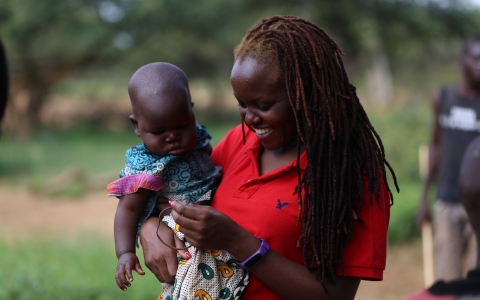Verah Okeyo is one of the first recipients of the inaugural ICFJ Alumni Reporting Grants. Learn about other grantees Phil Cunningham, Josh Landis and Ruth Olurounbi and Kelechukwu Iruoma.

Verah Okeyo’s father earned about $30 a month as a supervisor at a flower farm near Lake Naivasha in Kenya. Her mother was a midwife whose work included educating expectant and new mothers about health and sanitation. The family were provided their own house. The flower farm’s owners made sure Verah and her three siblings were provided with education and healthcare.
Okeyo lost her parents when she was 16 years old – her mother from an illness, her father not long after, from the heartbreak of his wife's passing. Despite that, looking back, 15 years later, Okeyo realizes she had a relatively privileged life growing up compared to many children in Kenya who have much less – especially when it comes to healthcare.
So when Okeyo became one of the data journalism grantees winners in the Microsoft News grant program in collaboration with the International Center for Journalists (ICFJ), she used the opportunity to learn more about child mortality rates in Kenya. It is a topic she often covers as a health care reporter for The Nation, the largest daily independent newspaper in Kenya, and part of the Nation Media Group, which operates in East and Central Africa. She wanted to know why, over time, mortality rates have declined in some of Kenya’s 47 counties but increased in others.
“In Kenya, if you belong to the have-nots, which is more than 70% of the population, your rights, particularly for health, are going to be trampled on a lot,” she says. “I grew up without much, but I was never denied health care, and health care with dignity.”
She learned that early on when, as a student journalist in college, she went to report a story at a maternity ward in a public hospital.
“I remember seeing three women in a bed, so I told the nurse, ‘Those three women must be very good friends for them to stay in one bed like that.’ The nurse looked at me and she rolled her eyes, and she said those three women were in that bed because there were no other beds. And that they had just had surgery. And I found that so appalling. Everybody was looking at me, as if ‘Why are you surprised? This is how public health in Kenya works.’”
It was her “aha” moment.
“People sleep on the floor sometimes in public hospitals, they share beds sometimes, there’s no running water in some hospitals,” she says.
Part of Okeyo’s project involved digging through demographic data going back to 1965, two years after Kenya won its independence from Britain. She learned that pneumonia is a primary cause of death for children in remote areas of the country, and diseases such as rabies, kala azar (transmitted by the bite of a female sand fly) and African sleeping sickness are often the leading causes of mortality in children ages 5 and younger.
Those diseases are part of a health classification known as “neglected tropical diseases” because they are exactly that – ignored in terms of education and attention around the world, yet they can also be fatal if they go untreated.
“Neglected tropical diseases are not only neglected by funding organizations, but by health care workers who do not even know about some of them,” Okeyo says. “You find these diseases among the poorest of the poor, because many of the diseases are brought about by not having proper food, access to clean water and to sanitation. These diseases kill people.”
Her work in public health follows in the footsteps of her mother. “She used to go to very, very difficult-to-reach areas, and tell them things like if they wash their hands, they will not get diarrhea. For me, this is continuing the work my mother had started.”
To tell the story, Okeyo used Power BI to visualize the data, county by county. During the process, the data led her to poor and remote areas of the country, something Okeyo felt was important for the investigative team to do to interview people beyond “the usual counties” near Nairobi.
The interactive data visualization and stories for the project are shared with the public via a web portal. She said the coaching and education she received from both Microsoft and ICFJ has helped her to become a “21st century journalist,” as well as a stronger one.
She also organized a recent panel discussion including a Kenyan health official and a UNICEF representative to talk about the project’s findings. She’s very determined to keep the conversation going about the need to improve health care and education for those most in need. “My main aim is to put neglected people in the public sphere.”
This article first appeared on Microsoft Stories here. Suzanne Choney is a writer with Microsoft Stories.